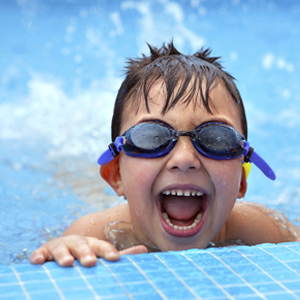

By Mercy's Bethany Pope
Water attracts kids and dogs and is a great source of summer fun. Keeping the dog safe around water is easy. They have a built-in swimming skill that humans missed. Keeping kids safe is a whole different thing. In fact, about 700 kids under the age of 14 die in the U.S. each year due to drowning and about five times that many have “near drowning” events. A large percentage of these life-threatening accidents occur in swimming pools.
Fun at the pool requires attention to PREVENTION of high-risk situations. This means planning to have adequate supervision, an appropriate water depth (shallow for non-swimmers, deep for jumpers or divers), age appropriate pool toys or accessories, rules for behavior, games, skills, equipment, and a backup plan in case of an injury.
The most important safety feature for a child in or near a pool is simply SUPERVISON. For children ages 1-4, the CDC recommends “in touch” supervision. That is, an adult or responsible individual is close enough to touch that young child in an instant. Regardless of age, supervising a child means visual contact, undistracted by phone or tablet, undistracted by good novel and undistracted by intense conversation.
Drowning is SILENT. Kids don’t yell for help. They don’t make a big splash. They lose control and go down, and if no one sees them, they stay down. The lifeguard may not be watching your child. The motel pool doesn’t have an observer. Did I mention supervision? It’s the No. 1 defense against an accident in the water.
For the home pool, an appropriate barrier around the pool is essential. Pool fencing should meet standards for height and for non-climbable height - the design shouldn’t include foot support for at least 40 inches of vertical space. Four foot chain-link fence can be climbed by 90 percent of 3 and 4 year olds. Self-locking gates are appropriate, and there shouldn’t be a direct connection from house to pool if child safety is a concern. In addition, hot tubs and decorative ponds should be considered swimming pools in disguise. Small children are still at risk. Supervision is paramount.
In the event, your child slips and is under water long enough to have a change in alertness or need help with coughing or breathing, he may need medical evaluation and 12 to 24 hours of observation to be sure he is medically ok. Call your pediatrician if you have any concerns.
As you enjoy the water this summer, just remember there’s no replacement for supervision when kids are playing near water. For additional resources, visit the American Academy of Pediatrics site for parents, www.healthychildren.org.
Dr. Robert Lynch, a Mercy Kids critical care physician, cares for kids in St. Louis County’s only pediatric intensive care unit at Mercy Children’s Hospital. For more information, please visit www.mercykids.org.
Mercy is the seventh largest Catholic health care system in the U.S., which serves millions annually. Mercy includes 46 acute care and specialty (heart, children’s, orthopedic and rehab) hospitals, more than 700 physician practices and outpatient facilities, 40,000 co-workers and more than 2,000 Mercy Clinic physicians in Arkansas, Kansas, Missouri and Oklahoma. Mercy also has outreach ministries in Louisiana, Mississippi and Texas.

